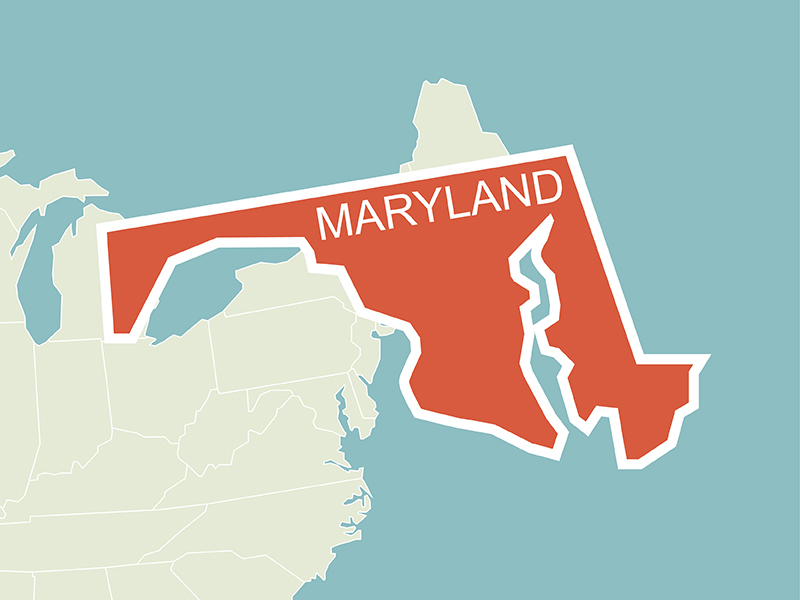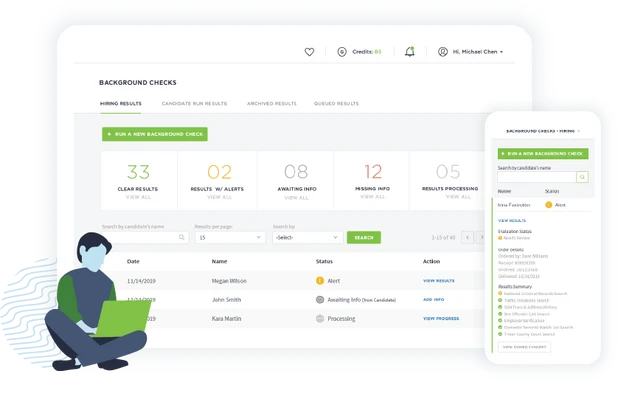
Table of Contents
Incorporating pre-employment background screenings into the hiring procedure enables companies to make well-informed hiring choices and mitigate risks by uncovering vital details about prospective employees. Nonetheless, it is imperative for employers to ensure that background checks are carried out in compliance with applicable federal, state, and local regulations. Continue reading to gain insight into background check practices and legislation in Maryland.
Organizations employ background screenings to assess potential job candidates or volunteers. The specific types of background checks conducted in Maryland can vary based on the nature of the position. However, common pre-employment screenings in the state encompass the following:
- Criminal background checks delve into national, federal, state, and county records to ascertain if an applicant has a criminal past. These checks may be more thorough for roles involving vulnerable demographics such as seniors or children. For instance, employment at childcare facilities in Maryland mandates an extensive criminal record examination, including searches of the state sex offender registry, state child abuse and neglect registry, the National Sex Offender Registry, along with an FBI fingerprint check. State criminal records checks are facilitated through the Maryland Criminal Justice Information System (CJIS), which serves as a central repository of records.
- Civil court checks scrutinize court records for instances of lawsuits, bankruptcies, foreclosures, and other civil disputes. These checks are commonly utilized when hiring for managerial or finance-related positions.
- Driving record checks peruse Maryland motor vehicle records to uncover details regarding an applicant’s license status, driving history, traffic violations, as well as DUIs or similar infractions. They are frequently employed for roles that entail operating vehicles or machinery.
- Credit checks examine a candidate’s credit history, revealing information such as collections, bankruptcies, and payment patterns. Typically utilized for finance-related positions.
- Employment verifications validate the accuracy of a candidate’s work history, including dates of employment and job positions.
- Education verifications confirm the schools attended by the candidate, dates of attendance, and degrees obtained.
How Far Back Do Maryland Employment Background Checks Go?
Employing an employment background check in Arizona is essential for maintaining a safe and efficient workplace environment. These checks enable employers to authenticate the information provided by candidates in job applications or interviews, offering insights into aspects of a candidate’s history that may not be apparent through other stages of the hiring process.
In Arizona, certain employers may be obligated by law to conduct pre-employment background checks. For instance, individuals seeking a contractor license must consent to a criminal background check specific to Arizona. Moreover, employers within the childcare sector, including those licensed by the Arizona Department of Health Services (DHS), certified by the Arizona Department of Economic Security (DES), or registered with the Arizona Child Care Resource & Referral (CCR&R), must conduct pre-employment background checks on all staff and volunteers prior to their commencement of duties.
What Shows Up On A Background Check In Arizona?
The extent to which an employment background check in Maryland can legally delve into one’s history hinges on two key factors: the nature of the background check being conducted and whether it is facilitated by a consumer reporting agency (CRA) or conducted independently. CRAs are bound by a seven-year lookback period for various records, whereas employers conducting their own searches face no such restrictions.
For background checks obtained through CRAs, the Fair Credit Reporting Act (FCRA) mandates a reporting limit of seven years for arrests without convictions, liens, collections, and civil judgments, with bankruptcies restricted to a 10-year timeframe. However, this seven-year constraint doesn’t apply to roles offering a salary of $20,000 or more, nor to searches performed directly by employers.
Employers conducting their own checks are permitted to delve into the past as necessary to verify education, employment history, credentials, or licenses. Regarding specific types of background checks in Maryland:
- Criminal record information: Maryland law prohibits CRAs from reporting any adverse information older than seven years, including arrests, indictments, or convictions. However, exemptions exist for positions with salaries exceeding $20,000. State guidance advises employers to consider only convictions directly relevant to the role and not expunged or sealed by the courts. Additionally, employers should assess factors such as the nature of the offense and the candidate’s rehabilitation efforts, aligning with Equal Employment Opportunity Commission (EEOC) guidance.
- Civil court checks: Both the FCRA and Maryland law restrict CRAs from reporting civil lawsuits, judgments, and paid tax liens older than seven years, unless the position offers a salary of $20,000 or more.
- Motor vehicle records checks: Typically, Maryland motor vehicle record (MVR) checks cover a three-year period. However, transportation network companies (TNCs) like Uber and Lyft are required to scrutinize the entire adult driving history of candidates for driver positions.
- Employment credit checks: Consistent with the FCRA, Maryland law limits CRAs from reporting bankruptcies older than 10 years or collections accounts older than seven years. Positions with salaries expected to reach or exceed $20,000 are exempt from these restrictions. Maryland’s Job Applicant Fairness Act imposes further constraints on background credit checks for employment.
How to Get A Maryland Background Check
Interested in acquiring a Maryland background check? Employers have the option to directly search Maryland records or enlist the services of a reputable CRA, such as Rapid Hire Solutions. While conducting the search independently may appear cost-effective, it often leads to additional time and effort, potentially hindering the hiring process and missing out on ideal candidates.
For instance, conducting a criminal records search independently entails completing necessary paperwork, applying for registration, and awaiting approval. Subsequently, employers must arrange fingerprint acquisition from the candidate, submit a request for the individual’s criminal records, and await the outcome. Similarly, businesses conducting motor vehicle records (MVR) checks must procure authorization from the candidate and either complete specific forms or subscribe to online services provided by the Motor Vehicle Administration (MVA) to access records.
These labor-intensive procedures can significantly impede background checks, possibly causing the loss of a qualified candidate to another employer. What if your preferred candidate accepts another offer while your screening is still ongoing?
However, delays aren’t the only risk associated with DIY background screenings. Employers must stay abreast of federal, state, and local laws governing background checks, ensure proper authorization from candidates, and adhere to all legal requirements.
Engaging a CRA like Rapid Hire Solutions offers substantial benefits, saving time, money, and ensuring legal compliance. Our user-friendly online platform streamlines the background screening process for both hiring managers and candidates. Moreover, our compliance features automate critical steps such as background check review workflows and initiating adverse actions. Leveraging our proprietary databases and extensive courthouse relationships nationwide enhances turnaround times for background checks, providing peace of mind for employers.
Maryland Background Check Laws
Employers conducting background checks in Maryland must adhere to the Fair Credit Reporting Act (FCRA), a federal law that governs various aspects of the background check process. This includes regulations on when background checks can be performed, obtaining candidate consent, disclosing results, and procedures if an adverse decision is made based on the background check.
Additionally, compliance with Maryland’s specific background check laws is crucial. State regulations cover criminal background checks, credit checks, and other types of checks, necessitating careful attention.
Maryland laws include:
MD STATE PERSONNEL AND PENSIONS CODE ANN. § 2-203
Public employers in Maryland can inquire into criminal history only after the applicant has been interviewed.
MD SENATE BILL 839
Employers, both public and private with 15 or more employees, cannot request disclosure of a candidate’s criminal record or accusations before the initial interview. Exceptions exist for certain positions involving minors or vulnerable adults, as allowed by state or federal law.
MD COMMERCIAL LAW CODE § 14-1203
CRAs are prohibited from reporting:
- Bankruptcies more than 10 years old
- Collections accounts more than seven years old
- Lawsuits, judgments, and paid tax liens over seven years old
- Records of arrest, indictment, or conviction over seven years old
Positions with salaries expected to equal or exceed $20,000 are exempt from these restrictions.
MD LABOR. & EMPLOYMENT CODE § 3-711
The Job Applicant Fairness Act explicitly prohibits employers from utilizing a candidate’s credit report to deny employment, terminate employment, or determine compensation or other terms of employment. However, exceptions exist where mandated by state or federal law, for specific financial institutions such as banks and credit unions, and for investment advising entities registered with the Securities and Exchange Commission (SEC).
Employers are permitted to request a credit report or credit history only under two conditions: 1) after extending an offer of employment, and 2) when the employer possesses a genuine, job-related rationale for seeking such information, while also notifying the applicant in writing of the request. Employers are presumed to have bona fide reasons for requesting credit reports in the following scenarios:
- Managerial jobs
- Jobs that have access to employees’ or customers’ personal information
- Jobs that have access to confidential business information such as trade secrets
- Jobs that provide expense accounts or corporate credit cards
MD LABOR & EMPLOYMENT CODE § 3-712
Employers are strictly forbidden from soliciting job applicants or employees for their usernames, passwords, or any other means of accessing personal accounts, including social media profiles.
Numerous cities and counties across Maryland have enacted local screening regulations that could affect employers and their candidates depending on their location. These laws encompass fair hiring practices and ban-the-box measures. In instances of uncertainty, employers might consider adhering to the most stringent laws to mitigate potential liabilities.
County Resources
Here are some resources to help you access background check information in some of Maryland’s largest counties. For statewide records, you can search on the Maryland Courts website.
ANNE ARUNDEL COUNTY
Anne Arundel County, bordered by the Chesapeake Bay, boasts a population of 588,261 residents and over 533 miles of coastline. With 173 square miles of water, it is renowned as the nation’s sailing capital and houses the U.S. Naval Academy. Among its most populous cities are Glen Burnie, Severn, Odenton, and Annapolis, which also serves as the county seat and the state capital.
For Public Information & Records, you can visit:
County Resources
Below are resources to assist you in obtaining background check information in some of Texas’s largest counties.
BELL COUNTY
Situated in central Texas, Bell County is conveniently located near Austin, Dallas, Houston, and Waco. Nearly 380,000 residents call Bell County home. Its largest city, Killeen, hosts the US Army’s Fort Hood, one of the world’s largest military bases.
For Public Information & Records, you can explore:
-
CITY OF BALTIMORE
As an independent city, Baltimore boasts a population of 585,708 residents within its 80 square miles. It’s renowned for its historical sites and museums and is located just 40 miles northeast of Washington, DC.
For Public Information & Records, you can explore:
The city of Baltimore has a ban-the-box law.
BALTIMORE COUNTY
Maryland’s third-most populous county, Baltimore County, is home to 854,535 residents across 682 square miles. Key cities include Dundalk, Towson, and Catonsville, with healthcare and higher education serving as major employers.
For Public Information & Records, you can visit:
CARROLL COUNTY
Bordered by Pennsylvania, Carroll County enjoys a rural setting while being in close proximity to Baltimore, Gettysburg, and Washington, DC. With 172,891 residents spread across 453 square miles, Eldersburg and Westminster are its most populous cities.
For Public Information & Records, you can explore:
CHARLES COUNTY
Located just 20 miles southeast of Washington, DC, Charles County offers ample opportunities for water sports, with 185 of its 643 square miles comprising waterways. It has a population of 166,617, with Waldorf being its largest city.
For Public Information & Records, you can visit:
FREDERICK COUNTY
An affluent and rapidly growing county in Northern Maryland, Frederick County borders Pennsylvania and Virginia. With 271,717 residents spread over 660 square miles, Frederick is its largest city.
For Public Information & Records, you can explore:
HARFORD COUNTY
Occupying 437 square miles, Harford County combines urban areas with rural charm along the Chesapeake Bay. Bel Air serves as its largest city and county seat, with healthcare being a major employer for its 260,924 residents.
For Public Information & Records, you can visit:
HOWARD COUNTY
With a median household income of nearly $125,000, Howard County ranks among the top 10 most affluent communities in America. Columbia and Ellicott City are its largest cities, with 332,317 residents spread across 250 square miles.
For Public Information & Records, you can explore:
MONTGOMERY COUNTY
Maryland’s most populous county, Montgomery County, boasts over one million residents within its 491 square miles. Renowned for its ethnic and cultural diversity, it borders the District of Columbia and serves as a significant hub for business and biotech research. The area is home to numerous national museums and federal government agencies, with healthcare and government sectors being major employers. The largest cities in Montgomery County include Germantown, Silver Spring, Gaithersburg, and Rockville.
For Public Information & Records, you can access:
Montgomery County has a ban-the-box law.
PRINCE GEORGE’S COUNTY
With 482 square miles ranging from rural areas to the Beltway bordering Washington, DC, Prince George’s County is the second-most populous county in Maryland. It hosts various federal governmental facilities and features award-winning parks, recreational spots, and historic sites. Government serves as the primary employer for the county’s 967,201 residents, with Bowie, Clinton, and Chillum being the most populous cities.
For Public Information & Records, you can refer to:
Prince George’s County has a ban-the-box law.
ST. MARY’S COUNTY
St. Mary’s County, settled in 1634 and site of the first Maryland Colony, retains some of the nation’s oldest buildings. With a population of 113,777, including many commuters to DC, the county’s major employers include military, defense contractors, and higher education. The largest cities in this 357-square-mile county are Lexington Park and California.
For Public Information & Records, you can visit:
WASHINGTON COUNTY
Washington County, bordered by Pennsylvania, Virginia, and West Virginia, holds the distinction of being the first county in the nation named for George Washington. Famed for its Civil War sites, 18th-century structures, historic stone bridges, and national and state parks, it has a population of 154,705 within its 457 square miles. Hagerstown serves as both the largest city and the county seat.
For Public Information & Records, you can explore:
Get A Maryland Background Check With Rapid Hire Solutions
Pre-employment background checks serve as a crucial component of the hiring process for numerous employers. By scrutinizing a job candidate’s background, you can identify the most suitable candidate while mitigating the risk of legal liabilities. While it’s feasible to conduct a Maryland background check independently, this approach can consume considerable time and entail potential legal risks. Engaging a third-party background check company like Rapid Hire Solutions can streamline the background screening process.
With over 100 background screening options, Rapid Hire Solutions offers a comprehensive suite of services that adhere to the Fair Credit Reporting Act (FCRA). Our user-friendly online platform and dedicated compliance experts alleviate the complexities associated with background checks. For further information about background checks with Rapid Hire Solutions, please reach out to our sales team.
DISCLAIMER
The resources provided here are for educational purposes only and do not constitute legal advice. We advise you to consult your own counsel if you have legal questions related to your specific practices and compliance with applicable laws


